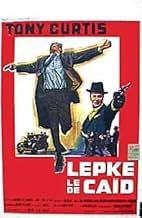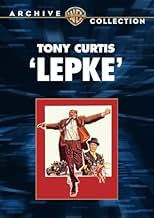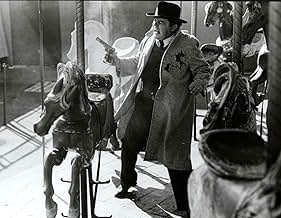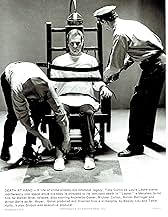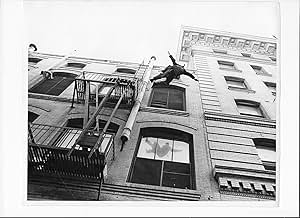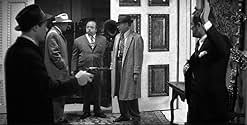Louis 'Lepke' Buchalter is head of Murder Inc., the syndicate that spattered the headlines of the day with blood.Louis 'Lepke' Buchalter is head of Murder Inc., the syndicate that spattered the headlines of the day with blood.Louis 'Lepke' Buchalter is head of Murder Inc., the syndicate that spattered the headlines of the day with blood.
- Director
- Writers
- Stars
- Director
- Writers
- All cast & crew
- Production, box office & more at IMDbPro
5.5472
1
2
3
4
5
6
7
8
9
10
Featured reviews
More of a 40s and 50s Film Noir throwback
Gangster pictures in the 70s get unfairly maligned. I put this down to being automatically being compared to The Godfather. The reason it's unfair is The Godfather is the first ever epic crime drama. Epics clock in at around 3 hours. It was like Giant from the 50s but with the mob as the focus. Every other movie in this genre was a Film Noir crime drama. Movies like Lepke, Capone and the Valachi Papers are like those movies but with more explicit language and graphic violence. As compared to other Neo Noir movies, this is a pretty good movie.
There's a fair amount of poetic license crowding out the timeline of actual events. There a few more good dramatic acting scenes (referenced in the goofs) which I appreciate seeing because this is a well acted movie with several surprising performances.
This might be Tony Curtis' best role as a leading man in the 70s. The movie had poor box office but I put that down to The Godfather effect. Crime Drama epics are still pretty rare (De Palmas Scarface is another, Scorsese didn't begin making them until after Good Fellas). Not many can manage them but if you like old time b movie Film Noir movies, this is one you might enjoy as well as Capone which features a strangely effective portrayal of the title character by Ben Gazzara.
There's a fair amount of poetic license crowding out the timeline of actual events. There a few more good dramatic acting scenes (referenced in the goofs) which I appreciate seeing because this is a well acted movie with several surprising performances.
This might be Tony Curtis' best role as a leading man in the 70s. The movie had poor box office but I put that down to The Godfather effect. Crime Drama epics are still pretty rare (De Palmas Scarface is another, Scorsese didn't begin making them until after Good Fellas). Not many can manage them but if you like old time b movie Film Noir movies, this is one you might enjoy as well as Capone which features a strangely effective portrayal of the title character by Ben Gazzara.
Curtis rocks
Brutal, straightforward bio-pic of the notorious Jewish gang boss. Writers Wesley Lau and Tamar Hoffs tell their sprawling story with fidelity to the headlines and nary a hint of what made this complicated mobster-cum-family man tick. (Curiously, there's never a mention of Lepke's infamous Murder Inc. operation, opting instead to concentrate on his drug trafficking and extortion enterprises.) Luckily, Tony Curtis' riveting performance fills in what the writers' have neglected, transforming Lepke Buchalter into a disturbingly three-dimensional character. Tossing off Yiddishisms with a sneer, keeping his impish smile to a minimum, he plays Lepke as a stone-faced ruthless street thug with a yen for power and conservative family values. It's as though Sidney Falco from "Sweet Smell of Success" had finally taken over J.J. Hunsecker's column. Whether snarling out death orders or tremulously asking his prospective father in law for permission to marry, Curtis invests the role with a skillful understatement (as well as a Bronx boy's veracity).
In the film's best scene, a queasy mixture of eroticism and complex emotions, Lepke is on the lam and holed up in a trollop's apartment. As the woman brazenly tempts him, Curtis silently and eloquently conveys the anguish of a lonely man struggling to remain faithful to his wife.
The director Menachem Golan is rarely this subtle, striving for ethnic texture and period color and overdoing both. Grubby hook-nosed Jews, swarthy pasta-eating Italians, and outsize Fedoras are shoved in our face. The violence is luridly overblown (a prostitute gets an ice pick thrust in her neck during lovemaking), and sometimes downright preposterous (a plate of spaghetti camouflages an explosive device). But just try to turn away from Curtis. With Anjanette Comer as Lepke's doting wife; Milton Berle, surprisingly restrained as her father; Barry Miller as the young Lepke; Vaughn Meader as an unlikely Walter Winchell.
In the film's best scene, a queasy mixture of eroticism and complex emotions, Lepke is on the lam and holed up in a trollop's apartment. As the woman brazenly tempts him, Curtis silently and eloquently conveys the anguish of a lonely man struggling to remain faithful to his wife.
The director Menachem Golan is rarely this subtle, striving for ethnic texture and period color and overdoing both. Grubby hook-nosed Jews, swarthy pasta-eating Italians, and outsize Fedoras are shoved in our face. The violence is luridly overblown (a prostitute gets an ice pick thrust in her neck during lovemaking), and sometimes downright preposterous (a plate of spaghetti camouflages an explosive device). But just try to turn away from Curtis. With Anjanette Comer as Lepke's doting wife; Milton Berle, surprisingly restrained as her father; Barry Miller as the young Lepke; Vaughn Meader as an unlikely Walter Winchell.
Tony Curtis provides a convincing performance
This movie is one in which Tony Curtis gives one of his best performances as Louis "Lepke" Buchalter. Curtis ,better known for his romantic and comedic roles proved to audiences that he could potray a gangster too, and does a damn good job of it!
Not bad, but inaccurate
Lepke traces the beginnings of Louis Lepke Buchalter from his days as a child thief to his eventual demise at the hands--or feet, if you will--of Old Sparky.
Pros: Tony Curtis gives an excellent performance as Lepke, conveying charm as well as ruthlessness. The other actors involved also give decent performances, particularly Milton Berle as Lepke's father-in-law.
As for the cons, the period sets don't look authentic. There was a big change in the streets and nightclubs from the 1920's to the 1940's in New York--not in this movie. Additionally, it's shown that Jack "Legs" Diamond was murdered by a contract killer, an ice pick in his ear. Nope. He was murdered in bed by at least three people. I guess killing him the old-fashioned way wasn't colorful enough for the producers.
Altogether, the film is fun to watch, buoyed by Curtis' performance, even though he doesn't age very much during his rise and eventual fall. But it's hardly accurate.
Pros: Tony Curtis gives an excellent performance as Lepke, conveying charm as well as ruthlessness. The other actors involved also give decent performances, particularly Milton Berle as Lepke's father-in-law.
As for the cons, the period sets don't look authentic. There was a big change in the streets and nightclubs from the 1920's to the 1940's in New York--not in this movie. Additionally, it's shown that Jack "Legs" Diamond was murdered by a contract killer, an ice pick in his ear. Nope. He was murdered in bed by at least three people. I guess killing him the old-fashioned way wasn't colorful enough for the producers.
Altogether, the film is fun to watch, buoyed by Curtis' performance, even though he doesn't age very much during his rise and eventual fall. But it's hardly accurate.
A compelling Lepke
The success of The Godfather films I and II certainly led to revival of the gangster film. Golan/Globus of Israel apparently decided that the Italians should not monopolize the epic gangster genre that The Godfather created so the film Lepke was born about the Jewish mob Murder Inc. from the 30s and 40s.
To say that Lepke is factual is to give it way too much credence. Though Thomas E. Dewey as special prosecutor and later New York County District Attorney certainly had Murder Inc under his sites the final conviction that sent Louis 'Lepke' Burkhalter to the electric chair was done in Murder Inc.'s own backyard of Kings County better known as Brooklyn. And Lepke was not the sole voice against a hit on Dewey, Charlie Luciano played here by Vic Tayback had more to do with it than Lepke. And Benjamin Siegel, AKA Bugsy who is a peripheral character in the film is addressed by one of his peers as Bugsy, as was told to us truthfully in Warren Beatty's film by one of his peers, that was one big no-no. It was name that Siegel did not appreciate.
Still Tony Curtis gives a compelling portrait of Lepke who when he wasn't dealing dope and extorting money from businesses for protection or muscling in on unions was by all accounts an exemplary family man. Anjanette Comer plays his wife and Milton Berle his father-in-law and Berle plays it totally straight, no Uncle Milty shtick.
Golan/Globus certainly got the ambiance right, but the fictional Corleones were given an epic quality that Lepke just doesn't have. Francis Ford Coppola certainly had a better vision than Golan/Globus had for Lepke.
But I would still recommend seeing Lepke and then reading about Murder Inc. to see just how factual the film was. And for what Tony Curtis did in the title role.
To say that Lepke is factual is to give it way too much credence. Though Thomas E. Dewey as special prosecutor and later New York County District Attorney certainly had Murder Inc under his sites the final conviction that sent Louis 'Lepke' Burkhalter to the electric chair was done in Murder Inc.'s own backyard of Kings County better known as Brooklyn. And Lepke was not the sole voice against a hit on Dewey, Charlie Luciano played here by Vic Tayback had more to do with it than Lepke. And Benjamin Siegel, AKA Bugsy who is a peripheral character in the film is addressed by one of his peers as Bugsy, as was told to us truthfully in Warren Beatty's film by one of his peers, that was one big no-no. It was name that Siegel did not appreciate.
Still Tony Curtis gives a compelling portrait of Lepke who when he wasn't dealing dope and extorting money from businesses for protection or muscling in on unions was by all accounts an exemplary family man. Anjanette Comer plays his wife and Milton Berle his father-in-law and Berle plays it totally straight, no Uncle Milty shtick.
Golan/Globus certainly got the ambiance right, but the fictional Corleones were given an epic quality that Lepke just doesn't have. Francis Ford Coppola certainly had a better vision than Golan/Globus had for Lepke.
But I would still recommend seeing Lepke and then reading about Murder Inc. to see just how factual the film was. And for what Tony Curtis did in the title role.
Did you know
- TriviaStar Tony Curtis with author Peter Golenbock revealed in Curtis' autobiography "American Prince: A Memoir" (2008) that he became heavily addicted to cocaine during production of this picture and would remain so for the next decade.
- GoofsIn the movie, Lepke's trusted partner Jacob "Gurrah" Shapiro is shot to death at Coney Island while trying to protect Lepke from assassins. In real life, Shapiro turned himself in to the authorities, accepted a prison term, and actually outlived Lepke by several years, dying in prison of natural causes in 1947.
- Alternate versionsCBS edited 20 minutes from this film for its 1983 network television premiere.
- How long is Lepke?Powered by Alexa
Details
Box office
- Budget
- $900,000 (estimated)
- Runtime
- 1h 50m(110 min)
- Sound mix
- Aspect ratio
- 2.35 : 1
Contribute to this page
Suggest an edit or add missing content


